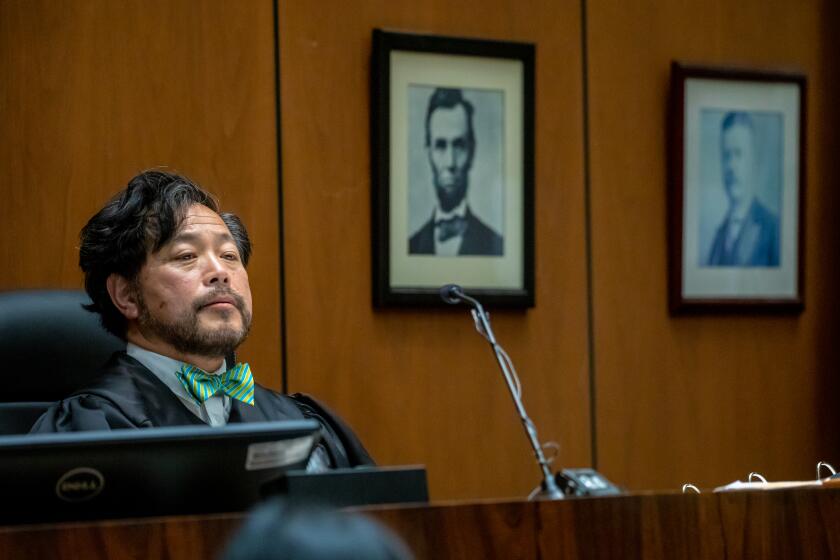Spotty redactions and public records reveal names of deputies in case against D.A. advisor

- Share via
One deputy was convicted of driving drunk with a loaded gun in the car. Another was suspended for failing to promptly report an on-duty traffic accident. An experienced detective was accused of lying on his job application. And a commander was demoted to captain for turning a blind eye to a cheating scandal in a popular law enforcement relay race.
For five months, California Atty. Gen. Rob Bonta’s office has fought to keep secret the names of eight Los Angeles County sheriff’s deputies at the center of the case against Diana Teran, a top district attorney’s office advisor accused of misusing confidential personnel records as part of an effort to track cops with disciplinary histories. She is now facing six felony charges under what legal experts say is a “novel” use of the state’s hacking statute.
Courtroom testimony during a preliminary hearing last month showed that the allegedly confidential records in question were actually court records. But state prosecutors still fought to hide the deputies’ names and the details of their past behavior by redacting identifying portions of key documents in the case.
After comparing gaps in the government’s redactions with hundreds of public civil suits, appeals and publicly posted disciplinary records, the Los Angeles Times and the Los Angeles Public Press identified seven of the deputies and tracked down court and public law enforcement records that shed light on the allegations against them and their efforts to overturn their punishments. In five of the seven cases the disciplinary actions were reduced or overturned.

“This just shows how Atty. Gen. Rob Bonta has wasted the time of several Los Angeles judges by asking them to keep these court records secret,” said Susan Seager, the UC Irvine law professor who has been fighting on behalf of the L.A. Public Press for the release of the deputies’ names since May. “Anyone can go to the Los Angeles Superior Courthouse today and find all the deputy lawsuits challenging their discipline and post them online. What happens in our public courts belongs to the public.”
The state prosecution of one of the L.A. County D.A.’s top lieutenants has ignited another round of criticism of the embattled progressive, but some legal scholars have questioned the validity of the charges.
Bonta’s office has argued that releasing the deputies’ names would be a violation of state laws that keep police personnel records secret, as members of the public would then be able to connect the deputies’ names to their past conduct and discipline.
A review of the deputies’ legal filings shows that at least half of the identified officers were disciplined for incidents involving an allegation of dishonesty. The punishments included everything from terminations to demotions to suspensions.
None of the deputies agreed to speak on the record, though one said he had never been officially informed about the case. James Spertus, the attorney representing Teran, said the news organizations’ efforts called into question the state’s theory of the case.
“The fact the court orders at issue in Ms. Teran’s case were located independently by the LA Times and the LA Public Press establishes the arguments that we have been trying to make since the case was first filed,” he said in a statement Monday. “She does not need ‘permission’ to ‘use’ public court orders.”
The California Department of Justice did not immediately offer comment.
In a statement, Steve Johnson, the president of the Los Angeles County Professional Peace Officers Assn., vehemently disagreed with release of personnel information, which he described as “stolen,” even though they were court records, and said that it would endanger deputies, families and peace officers who serve the community.
::
The allegations at the center of the case against Teran date to 2018, when she worked as a constitutional policing advisor for then-Sheriff Jim McDonnell. Her usual duties included accessing confidential deputy records and internal affairs investigations.
A few years after leaving the Sheriff’s Department, Teran joined the district attorney’s office. While there, in April 2021, she sent 33 names and a few dozen related court records to a subordinate to evaluate for possible inclusion in either of two internal databases prosecutors use to track officers with histories of dishonesty and other misconduct.
One is known as the Brady database — a reference to the 1963 U.S. Supreme Court decision Brady vs. Maryland, which says prosecutors are required to turn over any evidence favorable to a defendant, including evidence of police misconduct.
According to a 2021 Los Angeles County district attorney’s office manual, material relating to dishonesty, assaults, racial bias and acts of moral turpitude can all be relevant Brady material. Under office policy, prosecutors are required to turn over any material that could call into question the officer’s credibility — even if they believe that information might be false.
The state Department of Justice alleged several of the names Teran sent to her subordinate to consider including in D.A. databases were those of deputies whose files she had accessed while working at the Sheriff’s Department years earlier.
However, testimony during the preliminary hearing last month showed she did not download the information from the Sheriff’s Department personnel file system. In most cases she learned of the alleged misconduct when co-workers emailed her copies of court records from lawsuits filed by deputies hoping to overturn the department’s discipline against them.
But after searching news articles and public records requests, state investigators said they found that 11 of the names hadn’t been mentioned in public records or major media outlets. Thus, prosecutors said Teran wouldn’t have been able to identify the deputies, or know to look for their court records, were it not for her special access while working at the Sheriff’s Department.
At first, prosecutors charged Teran with 11 felonies under state hacking statutes — but they refused to release the names of the deputies or details of their misconduct, making it difficult for reporters or members of the public to fully understand the allegations at the center of the case.
After the Los Angeles Public Press fought in court for more information, in June the state released two of the names. Both deputies — whose records were easily discoverable through a Google search — had been fired for incidents involving dishonesty or false statements.
Without explanation, prosecutors later dropped the two counts against Teran involving those deputies, as well as a third count. According to what Spertus previously told The Times, the alleged victim described in the third count — identified as Deputy Doe 11 in court records — was a civilian employee and not a deputy.
Last month, L.A. County Superior Court Judge Sam Ohta tossed out two more of the counts against Teran following a four-day preliminary hearing at which he determined there was enough evidence to move forward to trial on the six remaining counts.
At the same time, in response to motions filed by lawyers for The Times and L.A. Public Press, Ohta ordered the release of unredacted exhibits that would identify most of the deputies. But he held the release of that information for three weeks to give the state time to file for appellate relief — which it did, arguing in a petition that the deputies’ “disciplinary matters here do not implicate any Brady obligations and/or were determined to be unfounded by the superior court in the litigation of those matters.”
The court of appeals denied the request.

But the redacted documents already made public contain distinctive notes and markings, as well as identifying dates and apparent redaction oversights, which make it possible to match them to public court records containing the deputies’ names.
On one exhibit, state prosecutors left public the department identification numbers corresponding to Deputy Does 7, 8 and 9. On another, they left public a connected civil case number. In at least four cases, handwritten margin notes and signatures made it possible to match redacted exhibits to the public versions of the same documents already in L.A. County Superior Court records.
To narrow down which court records to scour for matching pages, reporters created a database of disciplinary files already made public by the Sheriff’s Department, then searched those records for a series of dates referenced in an affidavit the state filed in June to justify the charges.
Of the seven deputies identified through those methods, at least two had legal appeals easily discoverable through a Google search. One had been demoted as part of an incident covered in 2013 both by The Times and by the news blog Witness LA.
Then-Cmdr. Patrick Jordan was knocked down to captain after a cheating scandal at the 2012 Baker to Vegas Challenge Cup Relay race, a 120-mile footrace that draws teams of law enforcement officers from around the world.
A team representing the Sheriff’s Department swapped out a deputy for an ineligible runner who was not a department employee. Though court records indicate Jordan didn’t learn about the switch until the morning after the race, he was later demoted because he failed to report it. He appealed unsuccessfully to the Los Angeles County Civil Service Commission, which upheld his discipline.
In 2016, a judge denied Jordan’s final attempt to reverse the disciplinary action. One of the documents in his civil case matches an exhibit in the Teran case, including a handwritten mark in the margin and a description of the discipline imposed. His employee identification number matches the one listed in another exhibit. Jordan could not be reached for comment Monday.
Judge in case against D.A. advisor Diana Teran tossed out two charges Tuesday and moved six other charges forward to trial
Another case involved a deputy working in Court Services. In 2009, Gerald Jackson used force on an incarcerated person who allegedly assaulted him and a fellow deputy, according to records from the lawsuit Jackson filed to overturn his discipline.
A civil lawsuit filed by the incarcerated person — which was ultimately dismissed — alleged that Jackson struck the jailed man’s eye repeatedly with a container, and beat and pepper sprayed him after a verbal altercation.
Jackson was investigated and eventually discharged in 2012, but court records show a judge reversed the decision two years later, when Jackson argued that the Sheriff’s Department had missed the deadline to impose discipline on him. A review of his court records showed that one document matches an exhibit in the Teran case, including a reference to the case number of another deputy who was involved in the incident.
Most of the cases involved deputies who entered their own disciplinary histories into court records when they filed suit. But in one case Sheriff’s Department officials brought the matter into the public record when they sued to challenge a decision by the Civil Service Commission to reduce a deputy’s discipline from discharge to a 15-day suspension.
Andrew Serrata, a former police officer from the defunct Maywood Police Department, was hired by the Sheriff’s Department in 2011 and later fired when the department realized that Serrata had incorrectly answered questions on his application related to his legal history, liabilities and debt.
Serrata had successfully been sued by an ex-girlfriend, had his wages garnished for several months, and still owed money — all of which he failed to disclose properly on his job application, according to a 2013 letter the department sent notifying him of its disciplinary decision.
Serrata — whose employee number matched one listed as a Deputy Doe in the Teran case — later appealed his discharge to the Civil Service Commission. The Sheriff’s Department objected, vigorously petitioning the court to overturn that decision and writing that Serrata’s claims were “simply, inherently unbelievable, and inexplicable for one filling out a form which warns that dismissal would result from misstatements.”
Ultimately, a judge sided with Serrata and the commission, and he kept his job until he retired in 2021. When reached by phone Monday, he declined to comment for this story.
The other deputies reporters identified faced discipline for allegations ranging from criminal convictions to crashes, according to records from the civil lawsuits they filed to challenge their punishments.
David Carbajal damaged his patrol vehicle and failed to promptly notify his supervisor about the damage or fill out the required forms to report the situation, resulting in a 10-day suspension.
Rachel Levy got into an altercation with a driver and used profanity after already being relieved of duty stemming from a separate incident. She was fired but ultimately successfully appealed her discipline to a 30-day suspension.
Salvatore Guerrero was discharged after a complaint stemming from a call for service in which a woman accused him of inappropriate behavior, including returning to the residence while off-duty. A judge ultimately ruled that the evidence did not support the allegations.
Jordan Kennedy pleaded guilty in Orange County Superior Court to driving drunk with a loaded duty weapon in his car. He was notified of the planned punishment — a 20-day suspension — while he was deployed overseas with the military. When he returned, he said he’d never been properly notified of the disciplinary decision, and a judge eventually ordered the department to overturn it.
Baca names transit supervisors to replace demoted officers
They could not be reached for comment, or did not respond.
Jonathan Abel, an expert on Brady material and associate professor at UC Law San Francisco, reviewed court records from the seven deputies’ cases reporters identified.
“There is nothing untoward about investigating these types of things,” he said, explaining that although dishonesty is the “core” of Brady material, past convictions could be a sign of “moral turpitude.” And sometimes uses of force can be relevant, as in cases in which a defendant accused of assaulting an officer aims to show the officer had a pattern of using excessive force.
“To build that [Brady] list, you would have to sink a few dry wells,” he continued, explaining the need to evaluate material that might ultimately be irrelevant. “How can you know whether something’s Brady or not until you’ve read the documents?”
A family member of one Deputy Doe — who asked to remain anonymous to avoid negatively affecting the deputy’s current job — said she’d been following the Teran case, even before the Sheriff’s Department reached out to alert the deputy to it several weeks after the matter became public. By that point, state prosecutors had already released two of the deputies’ names.
“It almost feels like they keep getting punished over and over,” she said.
This article was published in partnership with Los Angeles Public Press, a nonprofit news organization for the residents of Los Angeles County. Subscribe to its newsletter, and follow it on Instagram, X/Twitter, and Threads. Blakinger is a Times staff writer and Dugdale is a contributing writer with L.A. Public Press.
More to Read
Sign up for Essential California
The most important California stories and recommendations in your inbox every morning.
You may occasionally receive promotional content from the Los Angeles Times.














